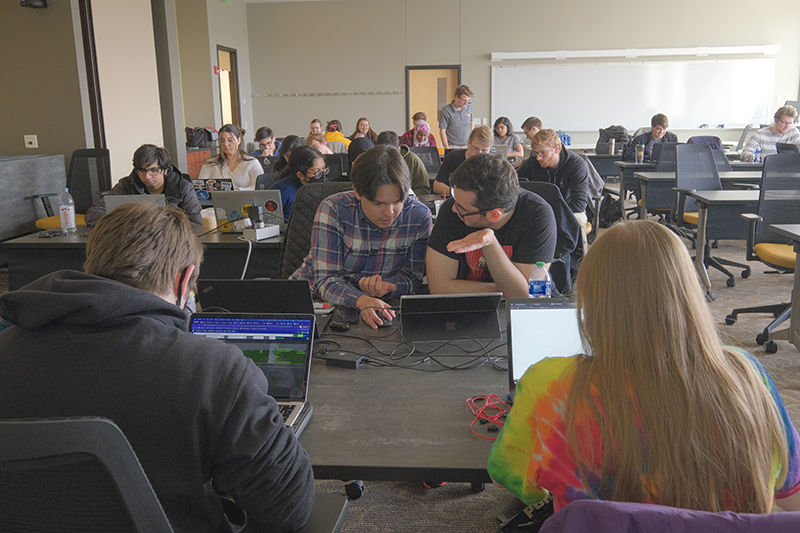The Center for Education and Research in Information Assurance and Security (CERIAS)
The Center for Education and Research inInformation Assurance and Security (CERIAS)

Purdue News
Win or lose, students who participate in Sandia National Laboratories’ annual Tracer FIRE challenge at Purdue have fun gaining real-world skills in cyber forensics and security.
During the two-day event held March 26-27 at Purdue, Sandia experts provided cyber-breach scenarios that put students on the front lines of a simulated cybercrime. Seven Purdue student teams and one team from Olivet Nazarene University competed to figure out the so-called cyber kill chain by tracing the stages of the cyberattacks, identifying the vulnerabilities that allowed the attacks, and traced the crime identifying who, what, where and how the crimes were perpetrated.
A junior studying cybersecurity and network engineering technology in Purdue’s Polytechnic Institute, Ethan Emmons from Edina, Minnesota, was one of four students on the first-place team. He said he enjoyed using his know-how to solve the challenges with his teammates.
“It gave me a realistic, low-stakes environment to apply the cybersecurity and networking knowledge and skills I have learned in the three years I have been at Purdue,” Emmons said. “From hard skills like identifying malicious network traffic to soft skills like presenting technical information to laymen, like management, I was able to demonstrate what I knew and, most importantly to me, identify the areas where I can improve.”
That’s all by design, according to Kamlesh “Ken” Patel, who manages Sandia’s campus partnership with Purdue and helps host the campus competition. “Tracer FIRE is a way for us to expose the next generation of cyber security professionals to research efforts underway at Sandia to solve challenging problems.” Patel said. “Students are more familiar with household names like Google and Microsoft. However, they may not know about career opportunities available in defending the nation against cyberattacks. This program allows us to help train top talent while students learn about careers in cybersecurity. It’s a win-win.”
Joel Rasmus agrees. Rasmus is the managing director for CERIAS, Purdue’s Center for Education and Research in Information Assurance and Security.
“Students from four of Purdue’s academic colleges participated in the Tracer FIRE cyberforensics challenge, which is ideal, because it illustrated in a real-world scenario that cybersecurity is not the domain of a single discipline,” Rasmus said. “The teams saw how creative thinking and problem solving as a group helped them identify the crime by ‘connecting the dots’ on what may first appear to be a string of unrelated network events. We’ve co-hosted this event for five years with Sandia, and it is a perfect example of our interdisciplinary approach to all aspects of cybersecurity, and that student’s education should not be reserved to the classroom.”
The Sandia Tracer FIRE program puts students in network environments where they safely interact with live malware in scenarios not unlike they would face in real-world situations. Having the knowledge and skill to confront exactly these types of events is critical in the field of cyber forensics.
Emmons’ fellow team member, Waleed Nasr of Bahrain, is a junior cyber security and network engineering major. It was his second time participating in Tracer FIRE. “I really enjoyed working with my team to solve problems methodologically, rather than guessing our way through the concepts,” he said. “I also enjoyed looking back at my first time participating in Tracer FIRE and noticing how much I learned over the past two years at Purdue.”
Rasmus said that students annually are invited from one other college — typically from a minority institution or a traditionally non-research-focused university. “This helps us broaden the training and experience to students outside Purdue to better prepare a diverse workforce for careers in cybersecurity,” he said. “We were pleased to have five very bright undergraduate students from Olivet Nazarene University participate this year.”
Tracer FIRE is among several Sandia programs and outreach events aimed at finding cybersecurity talent and actively participating in their learning experiences.
Writer: Amy Raley, araley@purdue.edu
Source: Kamlesh “Ken” Patel, kdpatel@sandia.gov